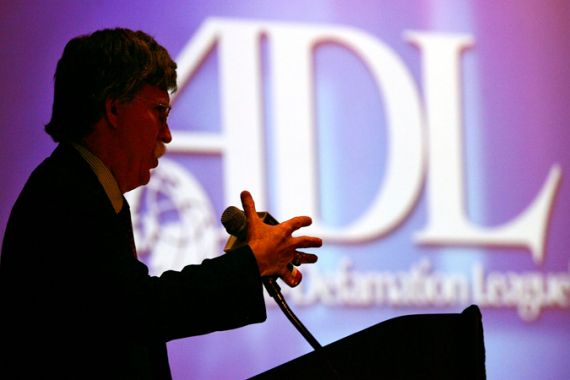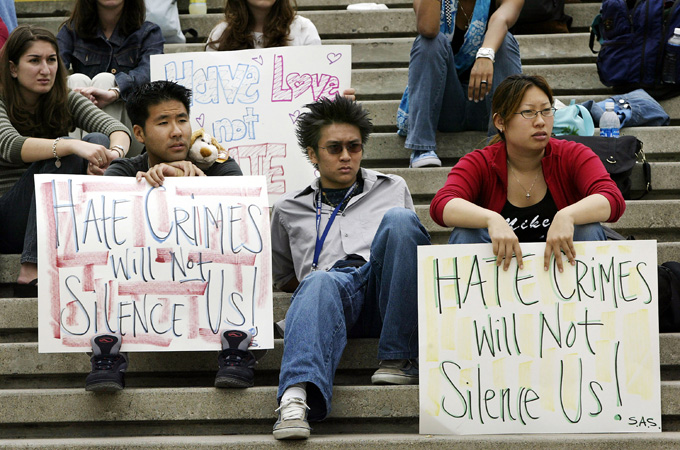Israel lobby empowers Palestinian solidarity
The ADL report targets pro-Palestinian student groups and warns college presidents they could lose funding for protests.

 |
| Police have cracked down on pro-Palestinian students on US campuses such as UC Irvine [GALLO/GETTY] |
The Anti-Defamation League is at it again.
On Wednesday, October 13, the ADL issued its latest report on student activism, trying this time to reframe all work in support of Palestinian human rights as being “anti-Israel”.
The report, “Emerging Anti-Israel Trends and Tactics on Campus”, targets Students for Justice in Palestine (SJP) and the American Muslims for Palestine (AMP), a national, grassroots nonprofit based near Chicago. Released a few days before the first national SJP conference at Columbia University in New York was set to take place, it accuses SJP chapters of fomenting “anti-Israel” programming on their respective campuses, while charging AMP facilitates the growth and development of these students’ groups. All of this combines to create an atmosphere in which Jewish students feel “insecure and unsafe”, the ADL claims.
It is important to note that SJPs are autonomous units and completely independent of AMP. Though our chairman, Berkeley professor Dr Hatem Bazian co-founded the first chapter in 1992, the student groups are not part of AMP. We offer SJPs the same help we offer others planning events about Palestine: Free materials, speakers and training.
|
“The ADL … equates working for Palestinian rights with delegitimising Israel.“ |
The ADL’s 12-page report and subsequent 57-page book “Fighting Back: A Handbook for Responding to Anti-Israel Campaigns on College and University Campuses” equates working for Palestinian rights with “delegitimising Israel”.
The ADL is trying to put activists on the defensive by shifting the argument away from Israel’s violation of international law and human rights to whether we do or do not support the state of Israel.
As media director for AMP, I conducted months-long research for an educational booklet on the ADL. What I found belies the organisation’s claim that it works to protect civil rights for all.
ADL and US security
It is true that some ADL work is positive and directly benefits society. But over the years, the organisation that was formed to fight anti-Semitism has morphed into an agency that advocates first and foremost for Israel by lobbying Congress and the media and by using intimidation and smear tactics to stifle any meaningful discourse critical of Israeli policies.
It also has a huge influence on security in this country and how law enforcement officials potentially view Arabs and Muslims by training hundreds of US police officers ever year. At least 44,000 law enforcement officers receive regular bulletins and newsletters from the ADL.
Probably most stigmatising, the ADL was caught spying on nearly 2,000 US citizens and organisations in 1993 when federal agents raided its West Coast offices and found hundreds of confidential files – many of them obtained illegally.
The ADL’s history of domestic espionage dates back to the 1930s and is still ongoing. As recently as its 2009 annual report, the ADL lauds itself on its “vast data collection” on groups and individuals with whom it does not agree.
According to its 2010 990 IRS tax form, the ADL spent nearly half a million dollars on direct lobbying in 2009. And with an annual salary and benefits package of nearly $700,000, ADL Director Abraham Foxman may have a vested interest in finding anti-Semitism where none exists, namely in student activism that advocates for Palestinian human rights.
The ADL’s report comes amid the larger context of increasing incidents of Zionist attacks on academic freedom on America’s campuses and the criminalisation of pro-Palestinian activism.
|
“An Israeli organisation … sent letters to hundreds of university presidents warning them they could lose federal funding if they allow pro-Palestinian events on campus.“ |
Earlier this year, the US Department of Education’s Office of Civil Rights began investigating charges of anti-Semitism at two or more universities, charges made possible by the October 2010 reinterpretation of Title VI of the Civil Rights Act. The ADL and other Zionist organisations had lobbied for this reinterpretation for seven years. If found in violation, the universities could lose their federal funding, a precedent that would have a chilling impact on Palestinian human rights advocacy on campuses across the country.
At the start of the academic year, an Israeli organisation, Shurat HaDin, sent letters to hundreds of university presidents warning them they could lose federal funding if they allow pro-Palestinian events on campus.
In September, ten California students were found guilty on misdemeanour charges of disrupting a public meeting for their role in protesting a speech by Israeli Ambassador Michael Oren; and several pro-Palestinian activists were subpoenaed by the US Justice Department last year. They have refused to appear before a grand jury that is secretly investigating such activism.
Finally, the Jewish Federation of North America will be discussing its campus outreach initiative – named the Israel Action Network – in a special session with Israeli Prime Minister Benyamin Netanyahu during its annual conference in November. The Israel Action Network is an off-shoot of the Israeli Advocacy Initiative, a program by the Federation and the Jewish Council for Public Affairs that seeks to garner support for maintaining the occupation by establishing relationships in the US government and also with other faith communalities through “interfaith cooperation”.
These are just a few examples that illustrate how difficult it has become to work in Palestinian advocacy in the United States.
But instead of demoralising us, attacks such as the ADL’s deepen our commitment for peace and strengthen our resolve for justice in Palestine – because it lets us know we’re making a difference. The movement for justice in Palestine is growing louder every day and that’s why Zionists who want to maintain the occupation are trying everything to silence it.
The ADL was once a highly respected organisation. But, sadly, today it has lost most of its credibility. The organisation can no longer be taken seriously as a protector of rights when, in its quest to support the occupation, it turns a blind eye to Israel’s rampant violations of international law and its human rights abuses of Palestinians and then vilifies anyone working to right those injustices.
Kristin Szremski is an award-winning journalist, with more than 20 years as an investigative newspaper reporter and editor. Currently, she is the director of media and communications for the American Muslims for Palestine.
The views expressed in this article are the author’s own and do not necessarily reflect Al Jazeera’s editorial policy.
